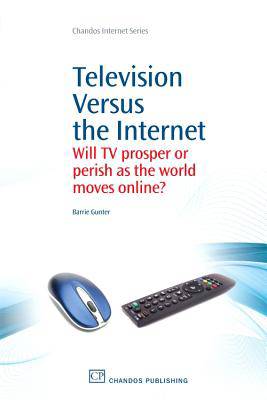
Door een staking bij bpost kan je online bestelling op dit moment iets langer onderweg zijn dan voorzien. Dringend iets nodig? Onze winkels ontvangen jou met open armen!
- Afhalen na 1 uur in een winkel met voorraad
- Gratis thuislevering in België vanaf € 30
- Ruim aanbod met 7 miljoen producten
Door een staking bij bpost kan je online bestelling op dit moment iets langer onderweg zijn dan voorzien. Dringend iets nodig? Onze winkels ontvangen jou met open armen!
- Afhalen na 1 uur in een winkel met voorraad
- Gratis thuislevering in België vanaf € 30
- Ruim aanbod met 7 miljoen producten
Zoeken
€ 76,95
+ 153 punten
Omschrijving
This book will explore the questions raised by the technological developments that have encouraged the multiplication of TV channels. TV is moving through a period of rapid change. Governments around the world are switching from analogue to digital forms of transmission to further expand the amount of content that TV signals can carry. At the same time, competition for eyeballs has also grown from outside that traditional marketplace with the emergence of the Internet. The roll-out of broadband and increased bandwidth has had the greatest impact on television because online technology can readily convey the same content. All these changes have created a great deal more competition for viewers within the traditional TV marketplace. The Internet has proven to be especially popular with young people who have adopted its applications to a far greater extent than their elders, though even the latter have now begun to take up online activities in significant numbers. Are these audiences the same? Do people make a choice between these two media or do they use them both at different times and for different reasons? Can television utilise the Internet in profitable ways to enhance its market position? Will television have to evolve from its current state to provide the kinds of content reception services to which people have become accustomed in the online world? If it does need to change to survive, will this nevertheless mean a radical new configuration of content and the disappearance of 'channels' with fixed, pre-determined programme schedules?
Specificaties
Betrokkenen
- Auteur(s):
- Uitgeverij:
Inhoud
- Aantal bladzijden:
- 208
- Taal:
- Engels
- Reeks:
Eigenschappen
- Productcode (EAN):
- 9781843346364
- Verschijningsdatum:
- 1/09/2010
- Uitvoering:
- Paperback
- Formaat:
- Trade paperback (VS)
- Afmetingen:
- 156 mm x 234 mm
- Gewicht:
- 299 g

Alleen bij Standaard Boekhandel
+ 153 punten op je klantenkaart van Standaard Boekhandel
Beoordelingen
We publiceren alleen reviews die voldoen aan de voorwaarden voor reviews. Bekijk onze voorwaarden voor reviews.











